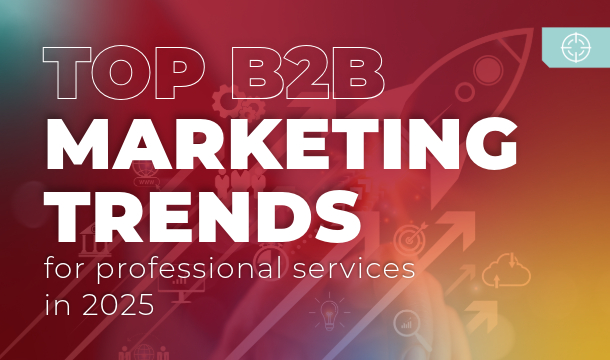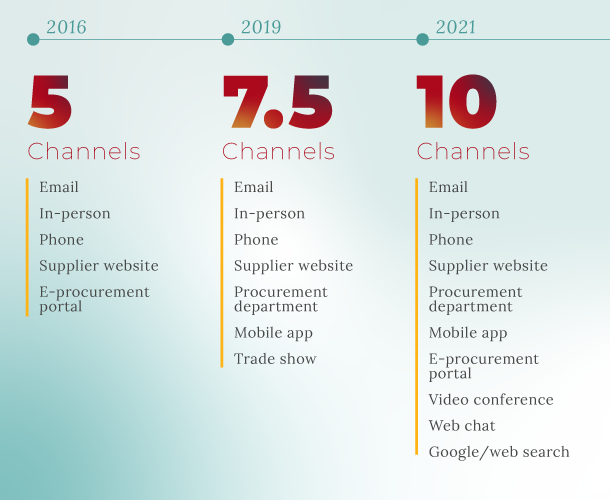Top B2B marketing trends for professional services in 2025
I wrote a predictions blog post in early 2020, but nowhere in that post were the words COVID-19, murder hornets or Black Lives Matter protests. Suffice it to say, that’s the last time I’ll ever write a blog post predicting anything. Instead, I’m sharing some trends I believe any professional services firm or B2B company should consider when implementing marketing strategies this year.
Trend #1: People are the new brands
As Ed Elson wrote on Scott Galloway’s hugely popular No Mercy / No Malice platform: “America has fallen out of love with brands and in love with people. This is evident in every corner of American life — from politics and business to technology and media. People are the new brands.”
Think: Joe Rogan vs. CNN.
Elson’s article delves into the psychology behind the trend: the internet has made us lonely, and we are, in turn, addressing that loneliness by seeking out social media accounts and videos of real people, aka influencers.
What does this mean for law firms, AEC firms, B2B companies and the like? This trend is no longer restricted to the consumer world. People connect with other people. Think about how you keep tabs on your industry. Who do you follow? Notice I asked “who” and not “what”? It’s a key distinction.
Instead of sending a newsletter branded with your company name, put a person behind it. Launch a podcast featuring your lawyers, architects, engineers and other experts. Showcase the people behind the insights you’re publishing. Let your prospects build a relationship with your people and watch your authority — and business — grow.
Trend #2: Omnichannel marketers win
Google is no longer the first port of call for many people when searching for information. Instead, according to Rand Fishkin, most people do the following:
- Browse social media, read email newsletters or attend a webinar and find something that sparks interest.
- Turn to Google or another search engine for “qualification.” (i.e., is what I read on LinkedIn credible? What has been written about this company or person? What other information is available on this topic? Should I follow this person? I’d like to know more: Do they have an email newsletter? What other information is available on their website?)
The Google search is now different, too. Artificial intelligence (AI) has disrupted the traditional inbound model of publishing informative articles that your information-hungry prospects will search for and find. Instead, AI-generated summaries provide the information they need, effectively blocking the path from a user’s search to your content.
This means you can no longer rely on a single channel (or even a few). Traditional inbound marketing no longer works, so you must take an omnichannel approach. Think: email, social, public relations, video, podcasting, in-person events, webinars, etc. Repurpose, repurpose, repurpose.
According to McKinsey & Co. research, B2B buyers often use 10 or more channels in their buying process. McKinsey also found that companies using more channels in their marketing were more likely to have gained market share in 2021 than those that did not.
Source: McKinsey
Trend #3: The sales cycle is getting longer and more complex
If it seemed like it took forever for prospects to make decisions last year, you’re not alone. And it started before 2024. Forrester’s 2023 Global B2B Buyers’ Journey Survey found extended sales cycles and expanded decision-making committees (including, notably, that “product experts” have the greatest influence on buyers — see trend #1 above).
“Due to budget constraints and continued economic uncertainty, buying decisions are getting delayed,” said Amy Hayes, Forrester’s vice president and research director.
Not only are sales cycles getting longer, but more people are getting involved, with increasing scrutiny and due diligence. What does this mean for law firms, AEC firms and B2B companies?
Your marketing can no longer focus purely on awareness (i.e., getting on people’s radars) but instead must focus on the entire decision-making process. This should include building trust, credibility, consensus and authority through extensive content. Think: case studies that demonstrate ROI, thought leadership that demonstrates expertise and videos that convey authenticity.
Trend #4: Original (non-googleable, non-chatGPTable) thought leadership is a must
As the trends above show, prospective clients today are skeptical. They’re also savvy. While this trend reinforces the points above, it’s important to emphasize: original, non-googleable, non-chatGPTable thought leadership is absolutely critical if you are a knowledge- and expertise-based business.
With AI-powered content flooding the internet and prospective clients taking longer to make decisions while consuming more content in more places than ever before, the only way to stand out is to offer something new and original.
At Reputation Ink, we’re practicing what we preach by embarking on our first-ever research project this year (stay tuned). Why? Because, after working with clients on research, we know that it’s not only PR gold — the ROI can be as much as 14X.
Trend #5: Podcasting is a B2B marketing powerhouse
When we launched our podcast in 2020, I honestly didn’t know whether the medium would grow in prominence like it has. But it’s undeniable how podcasting has impacted not only consumer culture but also the B2B business world.
More people than ever listen to podcasts, according to Edison Research. Those listeners are often affluent and educated, and they are highly receptive to the content and the people delivering it.
Podcasts work because they align with many of the trends I’ve noted above. They showcase people, not companies. They provide another channel beyond the traditional blog, while meeting your prospects wherever they are (on the road, while walking the dog or on the treadmill). They help you nurture prospects throughout that long, arduous buyer journey. They also provide an opportunity for you to showcase your original thought leadership.
Trend #6: AI continues to impact every aspect of business
I couldn’t write a trends blog post without mentioning AI, even though it’s sprinkled throughout the other trends. And I suppose that’s the point: AI is impacting everything. From optimizing business processes to disrupting traditional search models and helping marketers like me brainstorm ideas, AI is everywhere.
Marketers must understand how AI will — and could — impact their marketing. The best resource I’ve found for that is the Marketing AI Institute, led by Paul Roetzer (if you’re as old as me, you might know him from his PR 20/20 days). He’s written a book on the topic, and there’s even an annual conference, MAICON.
Like almost everything today, it seems, marketing changes at lightning speed. The Reputation Ink team can help you keep up. If you’re not subscribed to our newsletter, sign up here. And if I missed any important trends, I’d love to know. Email me at michelle@rep-ink.com.









